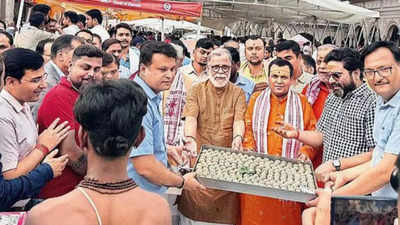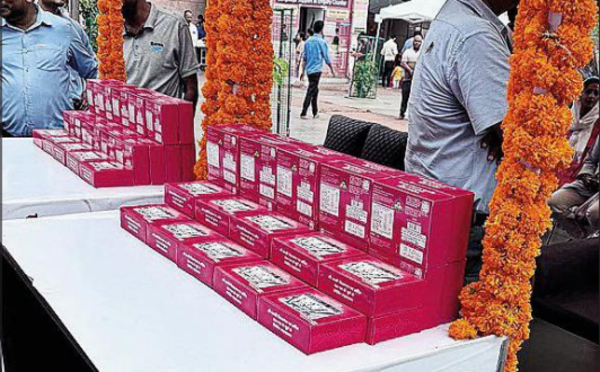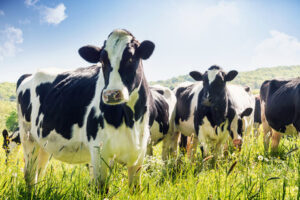

VADODARA: Amid the row over ‘laddus’ offered at the Tirupati temple, the ‘mahaprasad’ offered to devotees at the iconic Kashi Vishwanath temple in Prime Minister Narendra Modi’s Lok Sabha constituency, Varanasi, underwent a massive transformation.
Gujarat-based Banas Dairy, a member union of the Gujarat Cooperative Milk Marketing Federation (GCMMF) that markets dairy products under the brand Amul, started manufacturing ‘mahaprasad’ for the temple at its newly de veloped Banas Kashi Complex in Varanasi.
Amul has also been entrusted with the task of selling the ‘mahaprasad’ of the ‘tandul laddus’ at the temple’s prasad kiosk.

Moreover, the Varanasi unit of Banas Dairy prepared astandard operating procedure (SOP) for making the ‘mahaprasad’ that will be distributed among hundreds of devotees visiting the temple every day.
“It is the first time that the Shri Kashi Vishwanath temple trust prepared a special recipe of the ‘tandul laddus’ which was provided to us to prepare the ‘mahaprasad’,” said Jayen Mehta, managing director of GCMMF.
Until now, the ‘mahaprasad’ consisted of laddus made of wheat flour and dry fruits. The speciality of this new ‘mahaprasad’ or the tandul laddus is the usage of ‘belpatra’ or bel or the bilva leaves, which are considered sacred and offered on the idol of Lord Shiva at the Kashi temple, one of the 12 Jyotirlingas, the holiest of Shiva temples.
To begin with, Amul started selling the ‘mahaprasad’ at the temple kiosk. “We have enough manufacturing capacity to meet the future demand to cater to devotees both within Varanasi and across the country,” he said, adding that the plant has the capacity to manufacture 20 tonnes of ‘mahaprasad’ per day. The temple trust entered into an agreement with GCMMF and Banas Dairy for manufacturing the ‘mahaprasad’ laddus and preparing the SOP.
Dedicated line for making laddus at Varanasi unit
We have a sweet manufacturing plant at Varanasi where we have dedicated one line for manufacturing these laddus. Our endeavour is to ensure the purity of the ‘mahaprasad’ at all levels,” said GCMMF MD Jayan Mehta.
According to the SOP prepared by Banas Dairy and Amul, the bel leaves will be processed at the Banas Kashi Complex in Varanasi. The entire process of making prasad will be carried out in a spiritual environment of classical puja and recitations.
It will be monitored through 24×7 CCTV surveillance and background verification of the personnel involved in the prasad-making process.
Ingredients of the mahaprasad ‘tandul laddus’ include rice flour, ghee, cashew (6%), almond (5%), clove (0.7%), cardamom (0.7%), sugar syrup, and 0.7% extract of bel leaves. All the ingredients, including the rice flour, ghee, and sugar used for preparing the laddus, are as per the guidelines of the Food Safety and Standards Authority of India (FSSAI), the statutory food regulator. With modified atmosphere packaging, the shelf life of the packaged laddus has also been extended to maintain the quality of the prasad.
Production of Banaras sweets begin
Prime Minister Narendra Modi on Feb 23 this year inaugurated the Banas Kashi Sankul milk processing unit in UPSIDA Agro Park, Karkhiyaon.
During the inauguration, the PM underlined that the plant will play a key role in taking the sweets of Banaras to every corner of India.
Post-inauguration, the Banas Dairy’s Kashi Sankul started manufacturing and supplying two famous delicacies — the Banarasi ‘lal peda’ and ‘launglata’, which are marketed under the brand Amul.
Lal peda, one of the most popular sweets of Banaras that is offered to Lord Shiva at the Kashi temple, was traditionally made on a small scale by local sweet makers. The Banas Kashi Sankul started manufacturing this delicacy at its peda manufacturing line with a capacity of 1.5 tonnes per day (45 tonnes per month).





